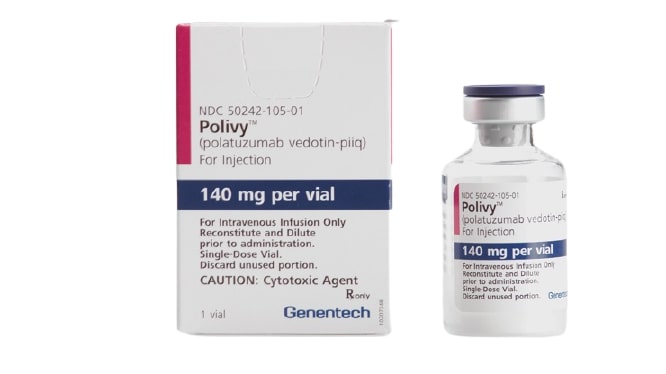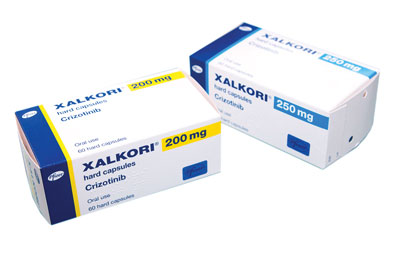Polivy (polatuzumab vedotin-piiq) vs Xalkori (crizotinib)
Polivy (polatuzumab vedotin-piiq) vs Xalkori (crizotinib)
Polivy (polatuzumab vedotin-piiq) is an antibody-drug conjugate specifically approved for the treatment of certain types of B-cell lymphoma, particularly in combination with other chemotherapy agents in patients who have relapsed or are refractory to prior treatments. Xalkori (crizotinib), on the other hand, is a small molecule tyrosine kinase inhibitor used primarily to treat non-small cell lung cancer (NSCLC) that is positive for ALK or ROS1 mutations, which are specific genetic alterations. The choice between Polivy and Xalkori would depend on the type and genetic characteristics of the cancer being treated; therefore, a patient should consult with their oncologist to determine which medication is appropriate based on their specific diagnosis and cancer profile.
Difference between Polivy and Xalkori
| Metric | Polivy (polatuzumab vedotin-piiq) | Xalkori (crizotinib) |
|---|---|---|
| Generic name | Polatuzumab vedotin-piiq | Crizotinib |
| Indications | Treatment of diffuse large B-cell lymphoma | Treatment of non-small cell lung cancer, ROS1-positive and ALK-positive metastatic NSCLC |
| Mechanism of action | Antibody-drug conjugate targeting CD79b | ALK and ROS1 tyrosine kinase inhibitor |
| Brand names | Polivy | Xalkori |
| Administrative route | Intravenous | Oral |
| Side effects | Neutropenia, anemia, thrombocytopenia, fatigue, diarrhea | Visual disorders, gastrointestinal effects, edema, elevated transaminases, fatigue |
| Contraindications | Hypersensitivity to polatuzumab vedotin-piiq or its excipients | Hypersensitivity to crizotinib or any component of its formulation |
| Drug class | Antineoplastic agent | Antineoplastic agent, tyrosine kinase inhibitor |
| Manufacturer | Genentech, Inc. | Pfizer Inc. |
Efficacy
Polivy (polatuzumab vedotin-piiq) Efficacy in Lymphoma
Polivy (polatuzumab vedotin-piiq) is a monoclonal antibody-drug conjugate that targets CD79b, a protein expressed on the surface of B cells. It is used in the treatment of lymphoma, specifically for adult patients with relapsed or refractory diffuse large B-cell lymphoma (DLBCL), not otherwise specified, after at least two prior therapies. The efficacy of Polivy was demonstrated in a pivotal clinical trial that combined the drug with bendamustine and rituximab (BR). This combination showed a significant improvement in complete response rates and overall survival compared to BR alone, making it a valuable option for patients with limited treatment choices due to the aggressive nature of DLBCL.
The approval of Polivy was based on the results of a multicenter, open-label, randomized study (GO29365 study). Patients treated with the Polivy combination had a complete response rate of 40%, compared to 17.5% for those who received BR alone. Moreover, the median duration of response for patients treated with Polivy was markedly higher. These results highlight the efficacy of Polivy in inducing a significant tumor response in a population with a poor prognosis.
Xalkori (crizotinib) Efficacy in Lymphoma
Xalkori (crizotinib) is primarily known as a treatment for non-small cell lung cancer (NSCLC) with specific genetic alterations (ALK or ROS1). It is an oral small-molecule tyrosine kinase inhibitor. While Xalkori has shown remarkable efficacy in NSCLC, its use in lymphoma is more limited and is generally considered off-label. There is some evidence suggesting that crizotinib may have activity in lymphomas that express ALK, such as anaplastic large cell lymphoma (ALCL), which is a subtype of non-Hodgkin lymphoma. However, the evidence for its efficacy in lymphoma is not as well-established as for Polivy or in the context of NSCLC.
Crizotinib's potential in treating ALK-positive lymphomas comes from its mechanism of action, which involves the inhibition of the ALK tyrosine kinase that can drive tumor cell growth. Some case reports and small studies have suggested that patients with ALK-positive lymphomas may benefit from crizotinib treatment. Nevertheless, larger and more definitive clinical trials are needed to establish the efficacy and safety of Xalkori in lymphoma patients. Until such data is available, the use of crizotinib in lymphoma remains exploratory and should be approached with caution, typically within the context of clinical trials or as a last resort when standard therapies have failed.
Regulatory Agency Approvals
Polivy
-
Food and Drug Administration (FDA), USA

-
Pharmaceuticals and Medical Devices Agency (PMDA), Japan

-
Therapeutic Goods Administration (TGA), Australia

Xalkori
-
European Medical Agency (EMA), European Union

-
Food and Drug Administration (FDA), USA

-
Health Canada

-
Pharmaceuticals and Medical Devices Agency (PMDA), Japan

-
Therapeutic Goods Administration (TGA), Australia

Access Polivy or Xalkori today
If Polivy or Xalkori are not approved or available in your country (e.g. due to supply issues), you can access them via Everyone.org.
How it works

Make an enquiry
Choose the medicine you want to buy, answer a couple of questions, and upload your prescription to speed things up. We’ll get back to you within 24 hours.


Make an enquiry
Choose the medicine you want to buy, answer a couple of questions, and upload your prescription to speed things up. We’ll get back to you within 24 hours.


Breeze through the paperwork
We'll guide you through the required documents for importing unapproved medicine, ensuring you have all the necessary information.


Get a personalized quote
We’ll prepare a quote for you, including medicine costs and any shipping, administrative, or import fees that may apply.


Receive your medicine
Accept the quote and we’ll handle the rest - sourcing and safely delivering your medicine.

Some text on this page has been automatically generated. Speak to your physician before you start a new treatment or medication.
Let's talk
If you have any questions, call us or send us a message through WhatsApp or email:
Contact us




